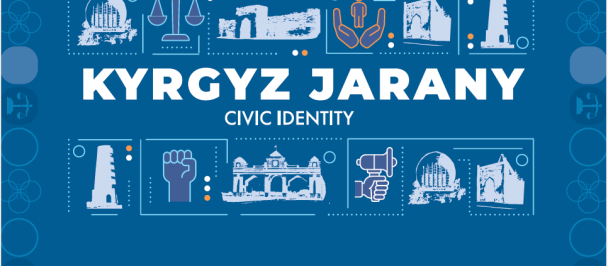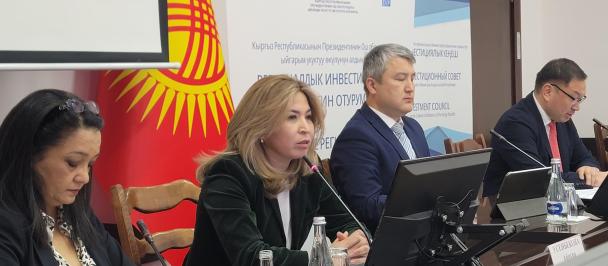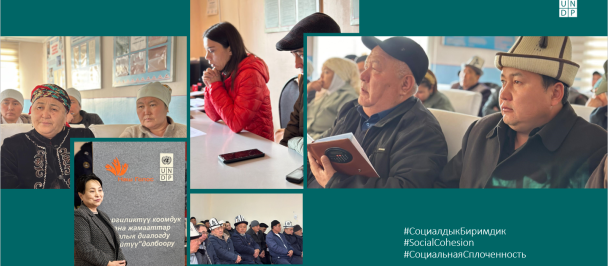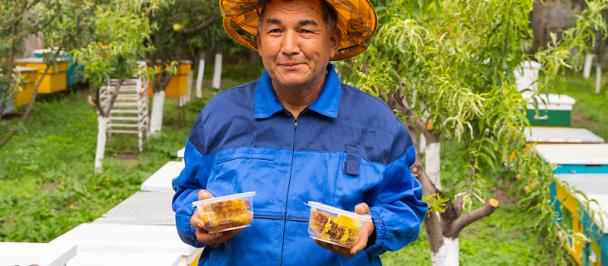Socio-economic recovery from negative consequences of COVID-19 in Batken, Jalal-Abad and Osh provinces of the Kyrgyz Republic
The project is funded by the Russian Federation and implemented by UNDP in the Kyrgyz Republic in cooperation with national partners under the frame partnership agreement between UNDP and Russia.
The COVID-19 outbreak in the Kyrgyz Republic has revealed significant gaps in health, economic, social, governance and political systems, underlining the need for a combination of rapid responses and structural reforms.
Gaps in the implementation of infection control and public health management predict a continued demand and need for building local production capacity for certified Personal Protective Equipment (PPE) and rapid deployment of digital solutions to ensure effective and safe remote-based healthcare provision.
The multi-ethnic communities from southern provinces of the country located in Ferghana Valley have felt the social and economic fallout more heavily. The fallout from the pandemic has also had a significant impact on livelihoods in this region, where the poverty rate is significantly higher at 30% compared to 22% in the rest of the country. The pandemic has widened this gap, with the crisis fallout leading to surge in new urban and rural poor. Economically reliant on cross-border trade, export routes and value chains that provided income for the predominantly rural and reliant on agricultural output region have become suppressed or broken. The region has been disproportionately affected; in many cases, women who are left at home to care for children and the elderly when men migrate for work have found themselves in an extremely vulnerable situation. The rapid depreciation of the Kyrgyz Som by more than 10% in mid-April and continued price hikes have led to reduced purchasing power, especially for the most at-risk groups. Furthermore, the country has begun seeing an increase in the number of migrants returning without jobs and income, many of whom will need support to reintegrate into their communities and to continue to help their families cope with the economic crisis. Finally, recent climate related disasters are likely to reduce harvest yield in autumn and threaten food security in the region.
Events that play out in the Ferghana Valley – Central Asia’s heartland that brings together Kyrgyzstan, Tajikistan, and Uzbekistan – have the potential to shape political, development, and security conditions internally and in neighboring countries. The COVID-19 crisis’ consequences for development, peace and social cohesion are undeniable. This has already been reflected in the increase of reported cases of domestic violence, cross-border tensions among communities, narratives associated with violent/hostile ideologies within communities and across, and social and political polarization.
To respond to these challenges, UNDP in the Kyrgyz Republic has designed a project that is innovative, human-centered, and agile in deployment. The interventions are tightly aligned with UNDP Country Offer and build on existing program activities geared towards early and resilient social-economic recovery and have support of the government. To achieve these outputs, the project will be covering three thematic areas:
- Promoting decent employment and supporting entrepreneurship to better recover after the COVID-19 induced crisis.
- Strengthening health sector’s emergency coordination, risk response and post-crisis recovery.
- Promoting digital solutions and accelerated digitalization.
These thematic areas will be achieved by implementing the following project components:
COMPONENT 1. Promoting decent employment through future-proof digital skills and supporting entrepreneurship to provide healthcare protection to people and doctors, which includes the following activities:
- Addressing the socio-economic impact of COVID-19 by building local capacity among women and youth through PPE production
- Digital Empowerment Programme for Youth and Women: “Digital Ayimdar” (Women)
- Coordination across Ferghana Valley to stimulate startups and innovations through digital networks and partnerships
COMPONENT 2. Building social cohesion for sustainable economic recovery and crisis response
- Strengthening Early Warning and Early Response (EWER) capacities for a comprehensive socially cohesive and community resilient response to the COVID-19 induced risks.
- Facilitating youth entrepreneurship and decent employment opportunities for returning migrants through economic empowerment to foster greater social cohesion
- Fomenting Cross-Border Trade Cooperation in Ferghana Valley through Evidence Based Policy Research on Joint Social and Economic Recovery
The total estimated number of direct beneficiaries under this program is a minimum of 10,000 vulnerable households (estimated at 50,000 beneficiaries). The main direct beneficiary groups will be newly unemployed women, returning migrants, and youth.
National Partners: Ministry of Economy, Ministry of Health, Ministry of Social Protection and Labor, State Service on Migration, State Agency for Environmental and Forestry Protection, National Institute of Strategic Studies, National Security Council, State Committee on Information Communication Technologies, Plenipotentiary Representatives of the Government of the Kyrgyz Republic of Osh, Jalal-Abad and Batken provinces.
Geographical coverage: Batken, Osh and Jalal-Abad provinces
Duration: April 2021-March 2024
Project Budget: 2,000,000 USD

 Locations
Locations


